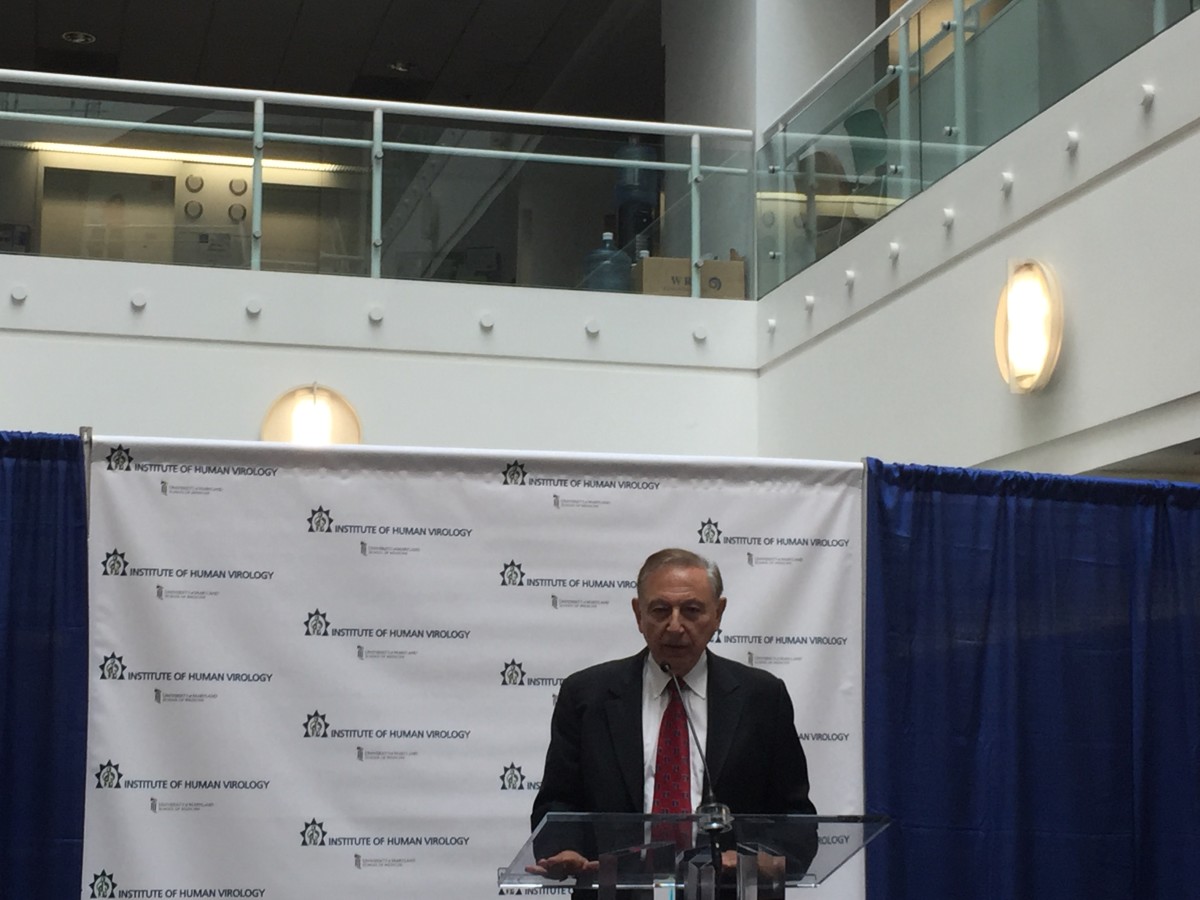In the 1980s, Robert Gallo was one of the scientists responsible for the discovery of HIV, and its connection with AIDS. Later, he pioneered the HIV blood test to screen for the disease.
These days, he is leading a team from the Institute of Human Virology (IHV) that is looking for a still-elusive cure.
“Remember that a vaccine against HIV does not rest on principles of classical vaccinology,” he told a group of reporters and officials, referring to the vaccine for another disease that also has yet to be released. “Ebola’s a snap compared to this.”
The group was gathered for the announcement of a milestone in the development of the treatment, known as an immunogen: the first clinical trials on the latest antidote, known as the Full-Length Single Chain, are set to begin this month at the Institute, which is located at the University of Maryland School of Medicine on the west side of downtown Baltimore.
“This clinical study is the first time this innovative vaccine candidate will be tested on humans,” Maryland Lt. Gov. Boyd Rutherford said in making the announcement.
The last HIV vaccine candidate to show promise was tested in 2009, as part of a study in Thailand led by the U.S. Army. That treatment was seen as a watershed because it worked about 30 percent of the time, but it wasn’t enough to receive approval for use. Gallo and his team think the latest treatment could be a step toward a vaccine that is even more successful.
The antibodies are designed to attach to regions of HIV that are common across strains of the virus. Those regions become exposed when the virus attaches to white blood cells that it is seeking to attack. Past trial vaccines have sought to target portions of HIV that are not common across all strains of the virus.
Along with the obvious challenge of inoculating against a disease that attacks the immune system, HIV is so difficult to cure is because the virus integrates into a person’s genes within 24-36 hours, which is very quick.
“The problem is the integration,” Gallo said. “We’ve got to make sure we stop all virus infection right at the beginning.”
The first phase of human trials will take about a year, and about 20 people will receive the treatment.
Given the size of the effort to find a cure for HIV, Gallo acknowledged that the team won’t be going it alone. The vaccine trials are part of a larger effort to develop an HIV vaccine funded by the Bill and Melinda Gates Foundation, the National Institutes of Health (NIH) and the U.S. Military HIV Research Program. If the Phase 1 trials are successful, a future Phase 1B would bring in elements of other trial vaccines.
“We will link it with other people’s vaccines to make sure it does the trick,” he said.
Gallo also sees a larger question that must be solved in the future. The antibodies produced for the vaccine do not currently last very long.
“We’ve got to solve the problem of getting the antibodies to last longer,” he said.
Nevertheless, the trial that is beginning now is a Baltimore-centered effort. Work on the vaccine is led by Gallo and a team at IHV that includes colleagues George Lewis and Anthony DeVico. Development and manufacturing has been under the purview of Profectus Biosciences, an East Baltimore biotech company that spun out of IHV that is also developing an Ebola vaccine. The trial vaccine was actually manufactured at facilities in North Carolina and Wisconsin. They tried to find a facility in Maryland, but couldn’t.
Profectus Senior Director of Virology Tim Fouts said the company issued the first publication about the vaccine in 2000. Since then, it has been seeking funding and carrying out trials in chimps. Along with ensuring the vaccine is safe, Fouts said the trials are necessary to determine whether the vaccine has the right “immune balance” for humans.
About 14 Profectus employees are working on the HIV vaccine, Fouts said.
Join the conversation!
Find news, events, jobs and people who share your interests on Technical.ly's open community Slack

Baltimore daily roundup: The city's new esports lab; a conference in Wilmington; GBC reports $4B of economic activity

Baltimore daily roundup: Find your next coworking space; sea turtle legislation; Dali raided and sued

Baltimore daily roundup: Johns Hopkins dedicates The Pava Center; Q1's VC outlook; Cal Ripken inaugurates youth STEM center


